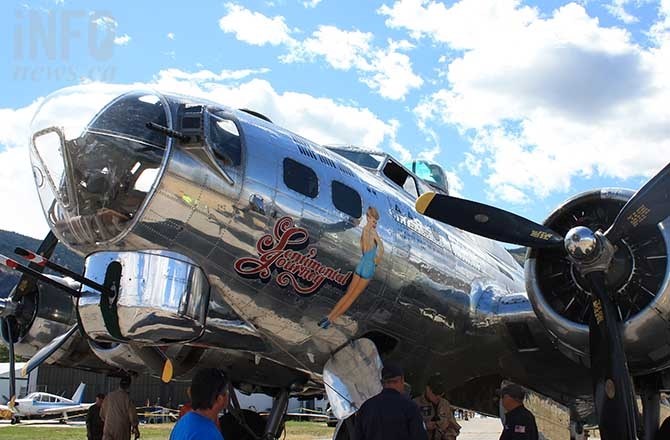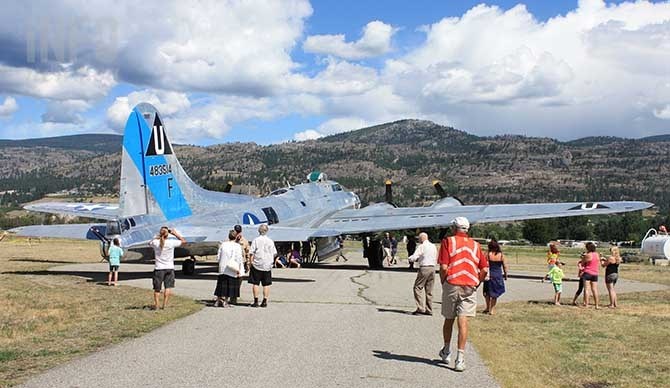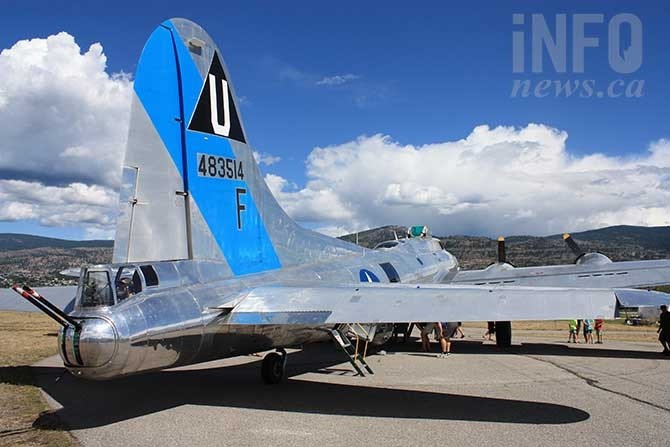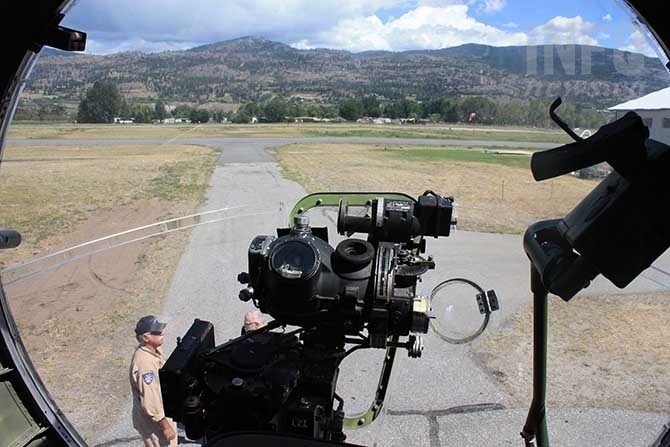
Sentimental Journey, a World War II era bomber is on disply at Penticton Regional Airport throughout the week.
(STEVE ARSTAD / iNFOnews.ca)
July 28, 2015 - 8:00 PM
PENTICTON - Penticton and South Okanagan residents have an opportunity to get up close to a vintage war machine this week.
A Commemorative Air Force Arizona Wing Aviation Museum aircrew arrived in the city Monday morning, July 27, with the museum’s 'Sentimental Journey,' the museum’s fully restored B-17.
The plane will be in Penticton until Aug. 2 for a week of tours and flights.
Penticton Flying Club member Don Hudgeon says Penticton was chosen by the museum as a tour stop this year because of the success of their visit last year, when the group brought a Mitchell B-25 bomber to the city.
“Their Penticton stop was the best of the tour, with more people taking flights than anywhere else,” he says.
The flying club helped Commemorative Air Wing co-ordinate their arrival and will be providing security and space at the airport for the vintage bomber.

Penticton residents enthusiasm for vintage war planes is the reason Commemorative Air Wing returned to the airport this year with a restored B-17 WW II bomber.
(STEVE ARSTAD / iNFOnews.ca)
The B-17 was the American counterpart to the Canadian and British built Lancaster World War II bomber. More than 12,700 of the war machines were built.
According to B-17 Loadmaster Mike Mueller the aircraft was the iconic bomber of the Second World War.
“It was responsible for more tonnage dropped in bombs, and was well known for bringing crews back home in spite of being heavily damaged,” Mueller says.
The cramped quarters inside the plane held 10 crew members, with four official gunner positions. Every crew member except the pilot had access to a weapon, however. The B-17 carried up to 8,000 pounds of bombs and was armed with 13 50-calibre machine guns.

The B-17's bomb bay. The bomber could carry up to 8,000 pounds of bombs.
(STEVE ARSTAD / iNFOnews.ca)
Sentimental Journey was one of the last B-17s built, constructed at the end of 1944. It arrived in the Pacific theatre too late for combat, but played a role in photo mapping and air-sea rescue operations. It was also used to monitor remote controlled aircraft that were flown through the mushroom clouds of nuclear weapons testing in the 1940s and early 1950s.
The plane’s last active service role was as a borate bomber, fighting forest fires in the U.S.
Mueller says only 20 of the aircraft survive, and of those only seven are airworthy.

The B-17 had a cruising speed of 160 mph, a top speed of 302 mph, and a range of 3,750 miles. It consumes 200 gallons of fuel per hour.
(STEVE ARSTAD / iNFOnews.ca)
The plane is open to public viewing, for a small fee, on the apron next to the Penticton Flying Club through the long weekend. Those wishing to take a flight are advised to call 587-338-8817 as there are no scheduled flight times. The B-17 can take up to eight passengers each flight.

The nose section of the B-17, showing bomb sights. Mid photo at right is the handle of one of two machine guns. Below, out of sight is the nose gunner's turret.
(STEVE ARSTAD / iNFOnews.ca)
To contact the reporter for this story, email Steve Arstad at sarstad@infonews.ca or call 250-488-3065. To contact the editor, email mjones@infonews.ca or call 250-718-2724.
News from © iNFOnews, 2015